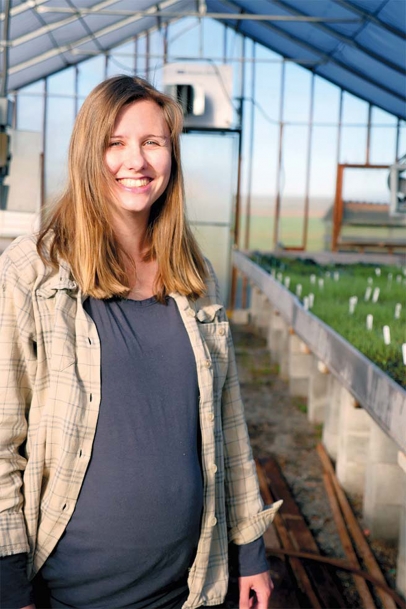Motherhood While Farming
Pregnant in Carhartts
When I was first starting my farming adventure in 2010, my husband Scott and I took a class called “Exploring the Small Farm Dream.” This class, put on by the Northeast Organic Farming Association of New Jersey, helps prospective farmers explore various aspects of what it might be like to run a farm. One of our assignments was to make a list of things we thought we’d have to sacrifice in order to begin a farm. Most notable of the things I listed was starting a family.
I had no farming experience and was leaving a stable, salaried job to take a low-paid farming apprenticeship. The coming economic instability, coupled with the challenge of learning a new skill set, made me feel like it would be years before I could throw motherhood into the mix. I also couldn’t fathom how, if I became pregnant, I’d be able to keep up with the demanding physical labor and long hours involved in farming.
I apprenticed at Cherry Grove Organic Farm in Princeton for two years and then found a management position at Lima Family Farms in Hillsborough. For the past three years I have managed Lima’s vegetable production, alongside a crew raising grass-fed beef, pastured pork, poultry and eggs. As I gained experience, I also came to realize I could rely on my coworkers and on the owners of the farm. Last year, well entrenched in my new career, I felt I was finally ready to become a mother.
In early 2015, Scott and I were ecstatic to find out we were expecting. The spring workload is always high as we prepare for the season ahead. During the early days of my pregnancy I was seeding transplants in the greenhouse, laying plastic mulch, running tractors and planting into the field. One weekend I spent hours sitting on the back of our water wheel transplanter as it wound its way through the field. The machine punched holes into the plastic mulch as I pushed plants into the soil, one after another. That night, I noticed I was spotting.
Medical testing over the next few days confirmed that I’d miscarried.
Although the doctors and midwives told me the baby had likely stopped developing because of a genetic anomaly well before I started bleeding, I still felt guilty about the amount of labor I’d been doing. I’d been trying to go about my job as usual, and I couldn’t shake the feeling that I’d done something to put my unborn baby in harm’s way. None of our family or friends knew about the pregnancy, as it was so early on. I couldn’t get myself to start a conversation where I had to explain both that I’d been pregnant and that I’d then lost it.
At the end of September, we learned that we were once again expecting. I was excited, but also terrified of having another miscarriage. I started to take it easier at work, not lifting anything too heavy and backing off from activities that felt like they were straining my body. I also decided to discuss the pregnancy with my boss early on so he would know why I was not completing certain tasks. Thankfully, he was not only supportive and understanding but also incredibly happy for me.
I was glad I confided in him, because I was soon dealing with morning sickness and extreme fatigue. I felt queasy all day, and by late afternoon I needed to lie down. I also developed joint pain in my hips from lifting things as light as crates of lettuce.
When I was about 18 weeks along, I had a scare. I was restocking items in our store, including frozen meats and jars of sauce, which I was carrying in small loads up a flight of stairs. That evening, I felt a stabbing pain in my abdomen. It was so severe that I couldn’t stand up straight and was in agonizing pain whenever I moved. My husband was panicked and wanted to go straight to the hospital. I insisted we call our midwives first.
They asked where the pain was and what it felt like. From my description, they were confident I had something called diastasis recti, which is when the abdominal muscles start to separate at the midline. It was not harmful to the baby or me, but I needed to take it easier to prevent further separation of my abdominal muscles, which could lead to an umbilical hernia. Just when I thought I was already taking it pretty easy, I was reminded I would have to be even more gentle with my body during this time.
With my due date in late May, I anticipate many challenges for the coming farming season. I won’t be able to participate in much of the labor that goes into setting up our vegetable production in the spring, including laying plastic, transplanting into the field and staking and trellising crops. In anticipation, we are hiring new crew members. I’ve written plans for our successive plantings throughout the season. I am hoping that, a few weeks after delivery, I will at least be able to participate in overseeing the field work, as well taking on more responsibility in sales and marketing.
Both my boss and I are aware that we can’t anticipate exactly what my job will look like once the baby comes—or when exactly I’ll be back to work. Like farming itself, motherhood is inevitably filled with uncertainty. We’re planning as best we can—and for the rest, we’ll just have to wait and see how it all plays out.
This next chapter of my life and farming career is sure to be a crazy adventure, but it’s one I’m looking forward to.





